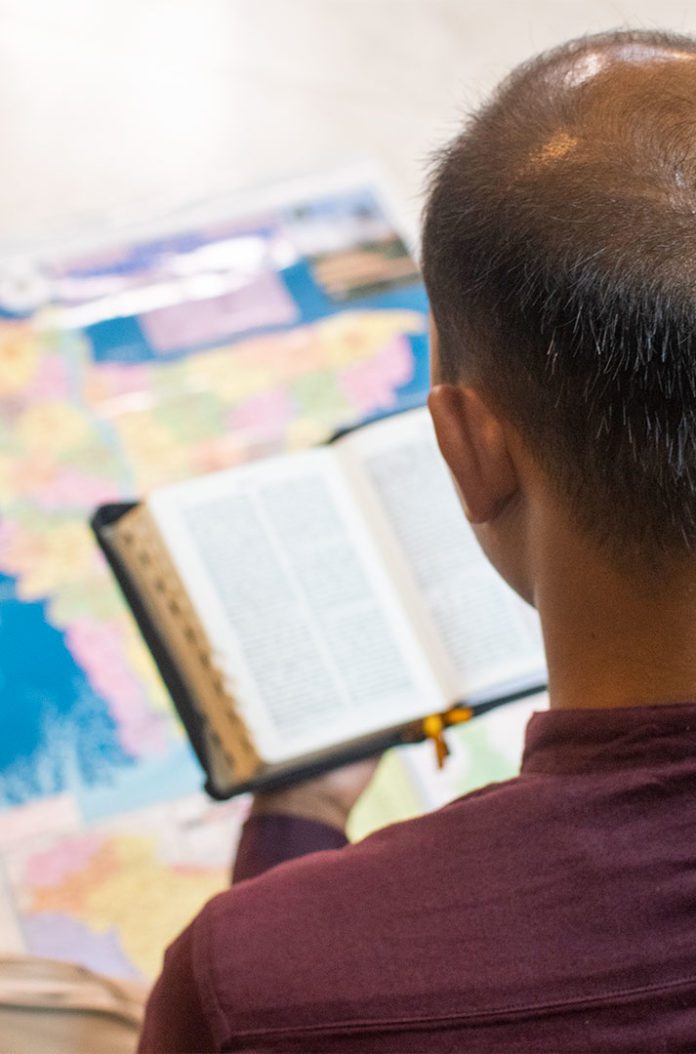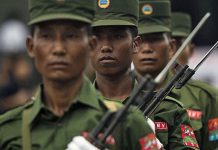
By Stefan J. Bos, Chief International Correspondent BosNewsLife
OKINAWA, JAPAN (BosNewsLife) – Japan has declined the refugee status of a Christian evangelist who fled his native Bangladesh after Islamic militants threatened to kill him for converting to Christianity and being forced to marry a Muslim woman.
Mark Huda Junayed Fino confirmed to Worthy News that Japanese immigration authorities refused to recognize him as a refugee because he was threatened by “Islamic extremist organizations or private individuals but not by the government” of the Islamic South Asian nation.
Fino now lives on the Japanese island of Okinawa, where he runs a food truck to make a living for his Christian wife and child and pay for his work as an evangelist. “Apostle Paul was a tent maker and also served in ministry.”
Fino spoke exclusively to a BosNewsLife reporter who followed his case since his detention in Bangladesh in 2012.
The 30-year-old came to symbolize the plight of Bangladeshi Christians converting from a Muslim, Hindu, Buddhist, or tribal background. In a recent assessment, the Open Doors advocacy group said these believers “suffer the most severe restrictions, discrimination, and attacks. As a result, they often gather in small house churches or meet secretly in groups due to fear of attack.”
According to U.S. officials and other sources, the Bangladeshi government has been reluctant to halt attacks against churches or individuals such as Fino. Yet, in a document obtained by BosNewsLife and its news partner Worthy News, Japan’s immigration authorities questioned the seriousness of the reported persecution of Christians and other minorities.
“Based on various information concerning your country of origin, the Constitution of your home country guarantees freedom of religion and prohibits discrimination on religious grounds,” said a letter issued by the Fukuoka Regional Immigration Services Bureau.
The letter is part of documents signed by Officer Oida of the Bureau’s Naha District Immigration Office. “The authorities of your home country have taken measures to accommodate the beliefs of non-Muslims,” the letter claimed.
It seemed a reference to the Bangladesh constitution asserting secularism as one of the fundamental principles of state policy. However, Article 2(a) adds, “The state religion of the Republic is Islam, but the State shall ensure equal status and equal rights in the practice of the Hindu, Buddhist, Christian, and other religions.”
SUPREME COURT
In 2015, the Bangladeshi Supreme Court rejected a petition challenging Islam’s status as the state religion.
And in the letter reviewed by the BosNewsLife and Worthy News agencies, Japanese immigration authorities acknowledged that Fino had expressed concerns about Bangladesh’s government policies and Islamic threats since 2012. Fino also made clear that his father was “violent” “and almost forced” him “to marry a Bangladeshi woman,” a Muslim, following his conversion to Christianity, the letter stated. “You have received threats from gangs or death threats from Islamic extremist groups, you have been arrested by the police, you have sent e-mails to your home country’s government from Japan expressing your opinions, etc.”
In documents obtained by BosNewsLife, the Bangladesh branch of the outlawed Islamic militant group Harkat-ul Jihad Islami threatened Fino with death if he remains a believer in Jesus Christ.
“You have become converted to Christianity by giving up the religion of Islam, which is a great crime according to Shariah [Muslim law] and an offense punishable by death,” said the letter purportedly sent by Harkat-ul Jihad Bangladesh. Fino, a former Muslim, was being told that “you are given [an] opportunity of 14 days for voluntarily embracing the religion of Islam”. Otherwise, “you yourself will remain responsible for your immature death.”
Yet, Japanese immigration authorities suggested that Fino had nothing to fear. “The authorities in your home country are not found to have any special circumstances such that they would ignore or encourage illegal activities by Islamic extremist organizations or private individuals. According to your statement, you were arrested by the police but were
later released. And other than this, there is no indication that any government officials in your home country contacted you.”
The Fukuoka Regional Immigration Services Bureau also told Fino that “you allege that if you return to your home country, you are in danger of being persecuted by Islamic extremist groups or gangs and that you are in danger of being persecuted by your home country’s government. However, the entity that you claim is persecuting you is not your home government, but Islamic extremist organizations or private individuals.”
The immigration authorities, part of Japan’s Ministry of Justice, said it was also “unnatural” that he had written to government officials to complain about his situation and reported persecution of other Christians. “Given that it does not appear that you are being closely watched by your home government, we do not believe that you are in danger of persecution as a refugee,” as defined in conventions and protocols, the letter said. “Even in light of your other assertions, you are not considered a Convention refugee.”
RESTRICTIVE POLICY
The apparent toughness towards refugees doesn’t surprise experts. At least 24 foreign nationals are known to have died in Japanese immigration detention centers, often because of maltreatment. “Japanese immigration policy is known for its restrictiveness,” said Jun Saito, a senior research fellow at the Japan Center for Economic Research. Even the “acceptance of foreign workers, especially of the unskilled, is very limited, and the share of foreign workers in the total labor force is still only 2.5 percent,” he explained, citing figures from 2015.
The Fukuoka Regional Immigration Services Bureau told Fino that he might take legal steps against the rejection of his refugee status. However, Fino confirmed to Worthy News that he would appeal the decision. “This is important not only for me but also for the many Christian refugees in a similar situation.”
Christian advocacy group Open Doors seemed to agree that devoted Christians such as Fino, who says he “was called to be an evangelist,” can face severe persecution in Bangladesh. “Protestant churches that are engaged in outreach among Muslim communities can also face persecution. The arrest of church leaders can destabilise Christian
communities and make them feel afraid to gather for worship,” according to Open Doors researchers.
“Even other denominations which have historically faced less persecution in Bangladesh, such as those affiliated with the Roman Catholic Church, are increasingly facing attacks and death threats.”
Bangladesh’s northern region, home to many ethnic minorities, is especially difficult for Christians, “with persecution coming from both the Muslim majority and Buddhist minority, as well as tribal communities,” Open Doors said in an assessment.
In recent years, more than 700,000 Islamic refugees have arrived from neighboring Myanmar, according to several sources, with the majority located in the Cox Bazar district in the southeast tip of the country. “Among the refugees are a tiny minority of Rohingya [Christian] converts, who can face pressure for their faith but have no means of escape,” Open Doors stressed.
Evangelist Fino said even though he may be able to stay in Japan as a married father and self-supporting Christian entrepreneur, he wants to be recognized as a refugee. “This is a matter of principle. The world should know about the suffering of persecuted Christians in Bangladesh.”
Christians comprise roughly 0.5 percent of the country’s mainly Muslim population of nearly 170 million, according to Christian researchers. Bangladesh ranks 30th on the Open Doors annual World Watch List of 50 nations where it claims Christians face the most persecution.









